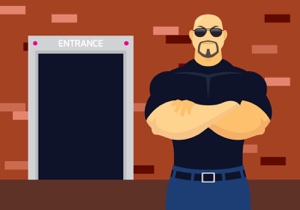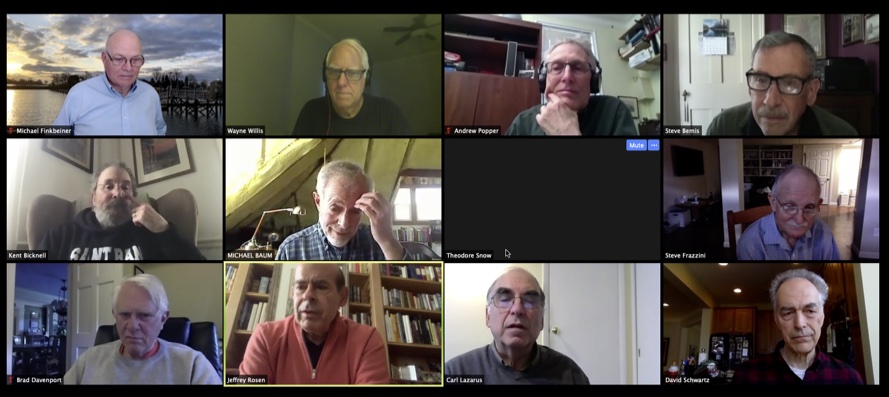First ’69 Classwide Zoom Meeting: Ken Davis
Over 120 classmates signed up to hear our classmate Ken Davis, CEO of Mt. Sinai Health System, give a short report from the front lines of COVID-19, followed by some Q&As. It was our first classwide Zoom meeting, and the feedback was overwhelmingly positive. (Some representative comments are included at the end of this post.)

There were two glitches on this maiden voyage of our online get-togethers. The first involved my not increasing the “max number of attendees” limit on the meeting. So, even though there were 124 signups, those arriving after 100 people were in the meeting confronted a technological bouncer that barred entry. My bad. Sorry. That won’t happen again, I promise.
The second glitch was an omission that turned out to have a silver lining. The problem: I didn’t record the presentation or the Q&A afterwards. That disappointed not only the 24 people who were barred entry but also several others who had scheduling conflicts and wanted to hear what Ken said. Sadly, we couldn’t provide a record.
The Silver Lining
As luck would have it, Tom Morgan recorded the Q&A part of the talk for his later review, and Ken has approved it for inclusion here. Ken also volunteered to re-record his opening remarks, so essentially we’ve been able to reconstruct the full meeting.
What follows is the 12 minute video of Ken’s opening remarks, recorded on 17 April. I make note that he “updated” some of the information he gave in the original talk (from 10 April): He reported on results from some of Mt. Sinai’s research that looks “very promising” in treating the worst aspects of the disease. He also pointed out that hypertension to be a common and significant risk factor, advising classmates, especially those treated with ARB and ACE Inhibitor medications, to consult their physicians and discuss possible alternatives. Even those of you who attended the original event will want to hear this again, especially those battling high blood pressure.
After these opening remarks, our Secretary Art Segal (who arranged this event with Ken) asked questions submitted by the audience via the chat window. You can hear Ken’s answers in the following sound-only recording. (Kudos to our co-editor, Harry Forsdick, the Engineer Extraordinaire, for taking the raw recording provided by Tom and filtering out background hum, improving loudness and adding clarity.)
At the end of the Q&A, I invoked a feature of Zoom called “Breakout Rooms” — where all attendees were assigned to one of 12 sub-meetings, by residential college. With the push of a button, the big group became 12 smaller groups. That way, everyone could visit with people they knew, “catch up” and socialize generally.
As luck would have it, both Ken and Tom Morgan were assigned to the Morse breakout room. After a few mutual, warm greetings, Ken’s Morse classmates asked a few more questions, and Ken has OK’ed us including them in the main Q&As. So what you hear next is both the public Q&A conjoined with the Morse Q&A, audio only.
The recording starts after Art Segal asked Ken the first question: “You have to interact with the public health system. Who calls the shots? And how are decisions made?”
The following are some of the remarks that people emailed, unsolicited. I passed them along to Art and Ken, and I thank you all for taking the time to share your reactions and offer encouragement for more such events:
- “Enormously helpful” – Bill Henning
- “Wonderfully illuminating—and sobering—discussion today. VERY useful to get unfiltered information from the front line. I should have known, but hadn’t fully realized, the immediate and potentially calamitous financial risk that some major medical institutions are facing due to COVID-19.” John O’Leary
- “Great session. Well done, and much appreciated!” – Hughes Norton
- “The Zoom call with Ken Davis was the most significant interaction I have had with classmates since I left New Haven in 1969.” – Guy Cooper
- “A very informative time. Thanks for organizing the event.” – David Murray, MD
- “Really this was an outstanding experience.” – Bill Newman
- “May I suggest that those who are in a position to do so consider donating to Mt. Sinai as a way of expressing thanks to Ken.” – Richard Breitman
- “It was very educational, a bit sobering (as I knew it would be), but all-in-all a very worthwhile experience.” – Ralph Swanson
- “The discussion was outstanding. Moreover, it was great having a chance to ‘see’ so many classmates. Well done!” – Joel Friedman
- “That was an interesting, scary, and important Zoom session today” – Fred Morris
- “Yesterday’s time with Ken was unforgettable—like talking to Ike in the middle of D-Day! As a Trustee at a hospital in California, I found his comments very sobering. And the college break out session was fantastic—and very informative.” – Walt Rose
- “A big thank you for the class discussion today on Covid-19. Art, that was informed and thoughtful moderating, both in the general session and the Silliman session. Wayne, the format and technical aspects of the whole thing were superb. I don’t know whose idea it was to break out into college discussion groups after Ken spoke, but it was very good. I have watched and read a lot about Covid-19 but this session ranked at the top. My wife, who also watched, agrees.”
- “Thanks for setting up this Zoom with Ken Davis. It was very well done and extremely informative. Also, a good catch up with classmates.” – Peter Jacobi
There were other notes of appreciation from Brad Davenport, Ron Netter, Dave Joseph, Larry Mirkin, Michael Yahng, John Corwin, Bruce Mazo, Bill Hall, Jeff Pollock, and Bo Riehle.


This Bloomberg article suggests the likely role of genetics in controlling and expressing each individual’s vulnerability to Covid infection.
It suggests that genetic factors may control the role of certain risk factors, like obesity and hypertension, and certain types of medicines in modulating the number of human cell receptors which render vulnerability to infection, a concept suggested in Ken’s comments.